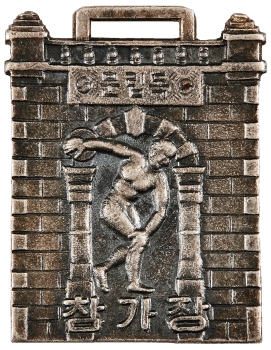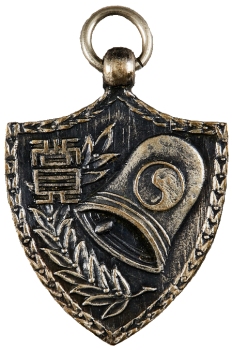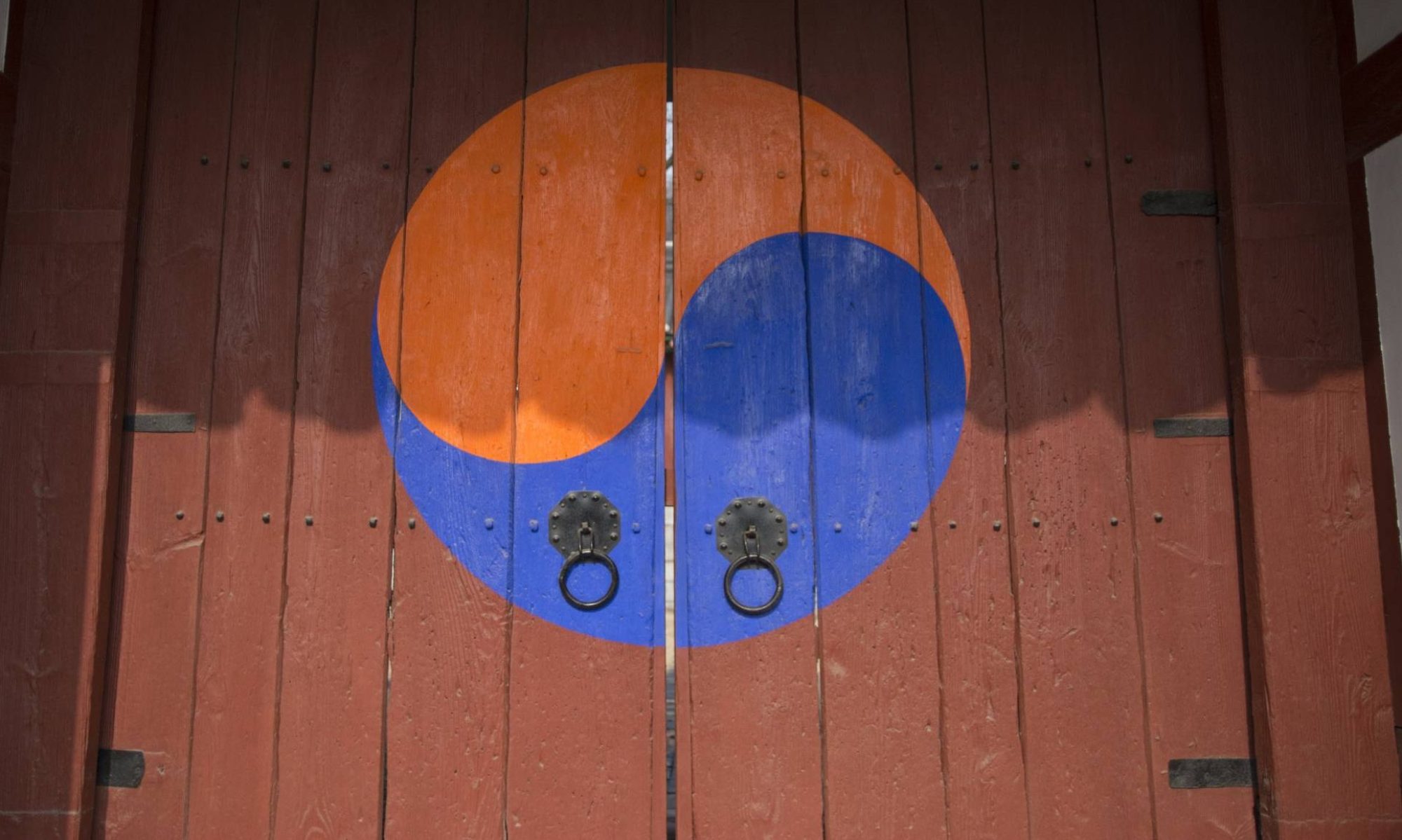For information on the Korean Orders and Merit Medals for sports, see Order of Sports Merit or one of the two webpages which contains a Merit Medal for Sports, namely: 1973 or 1984/2001.

Information source: eMuseum Identification #구입 11511

Information source: eMuseum Identification #구입 11510
In postcolonial South Korea, sports have been used as a special tool to achieve focused political aims, such as prevailing against the anti-communist and anti-Japanese competitions. But recently, as the Korean society becomes more affluent and mature, people began to enjoy the appeal of sports in and of itself.
During the Japanese colonial period, the Chosŏn Sports Council (CSC) was established on July 13, 1920, but was forcefully dissolved by the Japanese on July 4, 1938. After liberation, the CSC was reestablished on Nov. 26, 1945 and later renamed the Korean Sports Council. The Chosŏn Olympic Committee (COC) was established on either July 15, 1946, or June 6, 1947, depending on which source you use. The International Olympic Committee in Stockholm, Sweden approved the COC on Jun. 20, 1947. A team from Korea participated in the 1948 London Olympics. This was the first time Korea competed as an independent country. This was also, before the nation of the Republic of Korea was even created on Aug. 15, 1948. The COC was renamed the Korean Olympic Committee (KOC) on Sept. 3, 1948. In 1968, the Korea Sports Council was merged with the Korean Olympic Committee to unify the state management of sport.
During the Syngman Rhee presidency (1948-1960), the government was very negative about promoting sports because of the prevailing intellectualism. However, a militaristic and triumphalist sports culture survived as part of the colonial legacy. Victory, especially against Japan in international competitions, was a source of national pride. When President Rhee dispatched the national soccer team to Japan in 1953 for the first time after decolonization, he purportedly “encouraged” them by saying, “If you lose, throw yourselves into the border sea”. This famous anecdote speaks eloquently to the idea that sport was just a political tool at the time, and remained so well into the Park Chung-hee administration.
During the military regime and presidency of Park Chung-hee 박정희 (朴正熙 1961-1979), the same pattern was repeated. But unlike Syngman Rhee, he made substantial contributions to the development of Korean sports, particularly elite sports. He is sometimes referred to as “the ‘father of modern sports’ in ‘modern’ Korea”. As a military officer, he disdained the scholastic tradition, but recognized the fighting spirit and the function of the social integration of sports. The government tried to use sports to enhance its national prestige with the slogan “Physical Fitness Is National Power.” Major laws promoting physical education and sports were promulgated in the 1960s. The National Sport Promotion Law was enacted in 1962. The law and regulations guaranteed, for instance, special treatment for sport talents and exemption from sport-related taxes. In 1972, the Sport Promotion Foundation was established for the promotion and the implementation of mass sports and sport funds. Nevertheless, the socio-economic condition in the 1960s prevented the building of new sports infrastructures to cover the national need and to fulfill South Korea’s international ambitions. For instance, South Korea had to withdraw from staging the sixth Asian Games in 1970 due to the financial burden and a shortage in sport facilities.
In 1963, the Korean Ministry of education created an annual Athletic Award, and on Apr. 25, they awarded the first six athletic awards. This award was available to anyone connected to sports, including commissioners, coaches, and athletes.1 I have been unable to secure any pictures of this award.
South Korea has been competing in the Paralympics since 1968.
The presidency of Chun Doo-hwan (1980-1988) raised the status of sport as a tool to enhance national prestige with the slogan “the Establishment of a Sports Nation.” Korea hosted the Asian Olympic Games in 1986. The 1988 Seoul Olympic Games, which were hosted during the presidency of Roh Tae-woo (1988-1993), were the apex of sport policies under Korea’s military regimes.
During the 1986 Asian Olympic Games, held in Seoul, there were 462 Korean Orders of Merit were conferred. Two years later, during the International Olympic Games of 1988, there were 371 Korean Orders of Merit awarded. One of which, an Order of Sport Merit, First Class, went to Juan Antonio Samaranch, the President of the International Olympic Committee.
Military Exemptions for Athletes
Current conscription laws stipulate that athletes who win medals in the Olympic Games or gold medals in the Asian Games are granted exemptions, but are still required to do four weeks of basic training in the military. In 2011, the Military Manpower Administration proposed amendments to the exemptions: to include men who have not completed middle school, and to change to a points-based system on a prescribed scale for athletes who win in prestigious competitions. This is partly to address criticism for the easy exemptions and to recognize the privilege to those who show steady performance.
Notable athletes who have been granted exemptions are the bronze medal-winning football team of 2012 Summer Olympics and swimmer Park Tae-hwan. Mr. Park reported for four weeks of basic training on October 4, 2012, and was discharged on October 31, from boot camp in Nonsan, South Chungcheong Province.
Korea Armed Forces Athletic Corps
The Korean Armed Forces Athletic Corps 국군체육부대, commonly known as the Sangmu (상무), is the sports division of the Republic of Korea Armed Forces. Its headquarters are located in Mungyeong, Gyeongsangbuk-do. It was founded in 1984 by the integration of the athletic teams of ROK Army, ROK Navy and ROK Air Force.
Besides providing athletic training and facilities to serving active-duty military personnel, Sangmu also accepts qualified male professional athletes serving their mandatory military service. Athletes from team sports play for the Sangmu teams on loan from their parent club and return to their respective clubs at the end of their service. Serving Sangmu athletes may be temporarily released to participate in international competitions if called up by their respective sporting associations. Qualified applicants undergo five weeks of basic military training like all other recruits before being assigned to their respective athletic units. Due to their military status, Sangmu athletes are required to salute when the national anthem is played and are referred to as their rank instead of the honorific for athletes (seonsu, 선수) even at international competitions and tournaments. If the athlete is serving in the military, he may be granted an early discharge. Due to this policy, the topic of mandatory military service and exemptions garners increased public interest during the Olympics and Asian Games.
Pensions and Benefits for Athletes
A system was adopted in 1975, whereby, Korean athletes, who distinguished themselves in international competition, won lifetime pensions, with the amount proportional to the type of medal and event. At the time, the maximum pension is 1,100,000 won per month (approx. $1600 U.S. at that time).
In 2010, according to Korea Sports Promotion Foundation (국민체육진흥공단 KSPF)2 policy, an Olympic gold medalist can earn almost a 1 million won a month along with 90 pension points, while silver and bronze winners can make 450,000 won (30 points) and 300,000 (20 points), respectively. Pension points are added up to determine the total pension. If an athlete wins a gold medal, they receive a one-time cash payment of 5 million won for every 10 points over 110, or 1.5 million won for a silver or bronze. For example, if an athlete has 20 points entering the Olympic Games and wins a Gold Medal, he/she has now reached 110. He/she is now eligible for the full pension and will earn additional points with bonuses on any subsequent medal he/she wins. In addition to the pension and the bonuses, the medal winners will take a big wad of cash from the government and IOC member and former Samsung Chairman Lee Kun-hee. The government promised 40 million won for each gold medal, 20 million won for a silver and 12 million won for a bronze. Lee Kun-hee has said he’ll add half of what the government gives (prizes of 20, 10 and 6 million won). The cash awards can even extend to the coaches and support staff.
In 2023, the Ministry of Culture, Sports, and Tourism rewards 63 million won ($55,000) for each gold medal, 35 million won for silver and 25 million won for bronze. Medalists from team events receive 75 percent of the payout given to individual athletes. Each sports association or federation also give separate cash rewards to medalists. In addition, major corporations also pay out cash awards to medalists.
For example, archer An San, a triple gold medalist at the 2022 Tokyo Olympics, will be offered a total of 157.5 million won in financial rewards from the culture ministry, in addition to 95 million won from the Korea Sports Promotion Foundation and 1 million won in monthly pension for the rest of her life. For its part, the Korea Archery Association is expected to offer about 500 million won in cash rewards to her.
Repercussions to Pensions and Benefits
Korean athletes who finish third or higher in Olympic Games or World Championships are eligible to apply for homes through the special program, in accordance with housing supply rules of the Ministry of Land, Infrastructure and Transport. The country first introduced the home provision program for medalists in 1983, a year before the Los Angeles Summer Olympics, to boost the morale of athletes. Giving a qualification to apply for homes through the program does not mean that medalists are offered apartments unconditionally. They have to compete with others subject to this program, including individuals of national merits, such as war veterans, to win apartment subscriptions. A “fairness” issue regarding housing benefits given to Olympic medalists has come under the spotlight. The issue is being raised by some young people who have experienced unprecedented difficulty in buying a home, as the Moon Jae-in government has struggled to rein in runaway housing prices. Another group of recipients includes professional baseball or football players who earn billions of won in annual salary. Those who support the benefit said medalists deserve it, as they contribute to enhancing the national prestige and raising the public’s interest in unpopular sporting events, not to mention the national coffers.
There is a limited social safety net for athletes who get seriously injured, or who fail to make the grade. This has become a concern for many sports enthusiasts in South Korea.
North Korea
North Korea first participated at the Olympic Winter Games in 1964 and did not participate in the Summer Games until 1972. Their National Olympic Committee was created in 1953 and recognized in 1957. North Korean athletes have won a total of 57 medals, two of which were won at the Winter Games. North Korean news agencies can only report about North Korean victories, and victors are supposed to relate how their victory was all due to the Fatherly Leader and his wise guidance.
North Korean authorities decided to air the World Cup match against Portugal on live TV, which proved to be a huge mistake. It ended up being the biggest defeat in the history of the North Korean soccer (7-0). There were no further experiments with live sports in North Korea.
North Korea obtained provisional membership of the International Paralympic Committee in March 2012, entitling the country to take part in the Games. They made their Paralympic debut at the 2012 Summer Paralympics in London, with only a single competitor. The treatment of civilian invalids in North Korea is grim. They are not only disregarded as full-fledged members of society, but are removed from Pyongyang entirely as the capital’s aesthetic, it was decided, should not be tainted by the handicapped. Its propaganda has only recently tried to project an outward image of a superior socialist system, under which even the disabled can prosper due to the love of the great Marshal.
Merited Athlete 공훈체육인(功勳體育人) is an honorary title of North Korea awarded to “athletes and workers engaged in the athletic field who make distinguished contributions to the nation’s athletics, receiving the love and respect of the people for devoting themselves to national and social projects”. A typical achievement is winning a regional competition in Asia. The title was instituted in November 1960.
As of 1984, Merited Athletes are paid a 70-won (32-dollar) monthly pension after they retire at age 60, equivalent to an ordinary office worker’s pay. Merited Athletes have also been given fully furnished, luxury apartments. A Merited Athlete may become a sporting coach if they complete a four-year course at the Korean Athletics University. Sports people may also be awarded the titles of People’s Athlete 인민체육인 (人民體育人) or Hero of Labour 로력영웅 (勞力英雄). In 2001, the Korean Central News Agency (KCNA) 조선중앙통신 / 조선통신사 (朝鮮中央通信 / 朝鮮通信社)3 reported that 320 or more people have been awarded either the title of Merited Athlete or the related title of People’s Athlete since 1986 (Juche 75). On Dec. 8, 2011 (Juche 100) the KCNA estimated 200 sports persons have won the title of People’s Athlete over the past 45 years since the Presidium of the Supreme People’s Assembly issued a decree on the institution of the title in 1966 (Juche 55). North Korea has awarded prizes (type unknown) to its national football players and coaches for winning entry to the 2024 World Cup competition, their first entry in more than four decades. Since assuming power in 2011, Kim Jong-un has strongly prioritized sport and sports diplomacy. However, sports news has a low priority in comparison to the omnipresent personality cults of the Leader, the Commander, and the Marshal.
Footnotes:
- Korean Report, Volume Three, Number Three, April–May 1963, p.20
- The KSPF was founded on Apr. 20, 1989 and is headquartered in Seoul. It is part of the Ministry of Culture, Sports and Tourism and maintains a website at www.kspo.or.kr. KSPF receives funding from the government and revenue earned from Sports Toto, one of the korea’s few legal betting services.
- Founded on Dec, 5, 1946, it speaks for the Worker’s Party of Korea and the DPRK.
